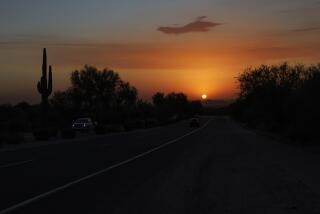Op-Ed: What makes us Californians for life
I ceased to be a New Yorker on Sept. 11, 2001. Until that point — although I had lived in Los Angeles for nearly a decade — it seemed possible to maintain the illusion that I was connected to both places: split loyalty. Then the twin towers fell while I remained safely at a distance, and my relationship to the city in which I was raised, in which I had forged my identity, irrevocably changed.
It’s not as simple to pinpoint the moment I became a Californian. Since I’m not a native, I’ve long referred to myself as a lifer, as if I were riding out a sentence of some kind. Call it reluctance, call it the transplant’s sense of exile, of having one foot in the present and the other in the past.
Lately, however, I’ve been aware of a shift in my thinking, as if my identity had been infiltrated, transformed. When a friend emailed recently to let me know about a job possibility in Manhattan, I wrote back, echoing Capt. Colby’s final missive in “Apocalypse Now”: “Find someone else. Forget it. I’m never coming back.”
Partly, this is a matter of time: I’ve lived in California for more than 25 years now, built a life and raised a family here. But even more it has to do with the state itself. For all its problems — its unstable ground and its tangled history of race and exploitation — California still speaks to something, a kind of promise that connects me to it — and perhaps never so much as now.
Now that so many of our most essential human aspirations have come under attack in the broader culture, California functions as a counterweight.
“Like the rest of America,” Wallace Stegner famously wrote, “California is unformed, innovative, ahistorical, hedonistic, acquisitive, and energetic — only more so.” The line is often misread, or paraphrased, as if to set California apart from the remainder of the nation, when in fact what it’s suggesting is the opposite.
And yet that “only more so” is the key idea. California is a heightened landscape, where the polarities tend to be larger than life. On the one hand, we have given the country Richard Nixon and Ronald Reagan, not to mention the John Birch Society. On the other, Upton Sinclair’s 1934 End Poverty in California campaign for governor, the Black Panthers and Brown Power, Haight-Ashbury and Harvey Milk.
You could argue — as politicians and activists have for decades — that there is no single California, that it should be divided north and south or east and west. “The seven states of California,” historian Philip L. Fradkin called it in his 1995 book of the same name. Bay Area financier Tim Draper proposed a ballot measure in 2013 (it failed to get sufficient signatures) to divide California into six parts, and a similar logic helped fuel the now-stalled “Calexit” secession movement, which gained traction briefly in the wake of the 2016 presidential election.
Of course, California’s ungovernability is part of its identity — and part of ours. It’s a young state, a young culture, very much a work-in-progress, a place we must continually reshape. Radically transformative events have taken place within living memory, from the building of the freeways to the repeal of anti-miscegenation laws, from the first paid-family-leave policies to clean-air statutes, from the Free Speech Movement to “sanctuary” cities.
Such forward thinking gets our state stereotyped as the fringe, the far edge.
Consider the ideal of California as Land’s End, the apotheosis of the last chance, a place to run to rather than to come from. That’s a myth that lingers, even though it’s no longer appropriate, if it ever was. To think in such terms, as Richard Rodriguez insists in his essay “Late Victorians,” is “to read the map from one direction only — as Europeans would read it or as the East Coast has.” As of 2000 (and for the first time since the Gold Rush), the majority of the state’s residents are native born, not newcomers or transplants.
I don’t mean to come off as a California booster; I’m well aware of the ways the state disappoints. But now that so many essential human aspirations have come under attack in the broader culture, California functions as a counterweight — or even finally, as a center, a norm of its own.
When I was 13 or so, I had a dream in which I was riding on a bed, rolling down the center of a boulevard with skyscrapers on either side. This, I imagined, was New York, despite the fact that it was unlike any New York I knew. Then I moved to Los Angeles, where, on one of my first weekends in the city, I went for a drive down Wilshire Boulevard in Westwood and recognized the setting of my dream. I don’t claim a mystical connection with the place. But there is a whisper in that dream of belonging to something recognizable, secure and right, even though I’d yet to see or experience it.
California has its problems, sure it does; there’s no such thing as utopia. Still, what once seemed to me a place of exile now feels like nothing so much as home.
David L. Ulin is a contributing writer to Opinion.
Follow the Opinion section on Twitter @latimesopinion and Facebook
More to Read
A cure for the common opinion
Get thought-provoking perspectives with our weekly newsletter.
You may occasionally receive promotional content from the Los Angeles Times.











